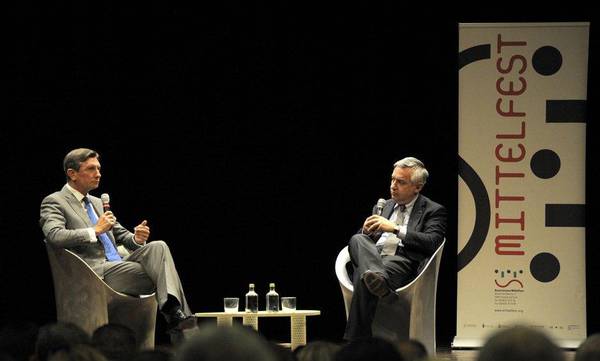Mittelfest: Pahor, let's get used to multi-speed Europe
Slovenia's president, we'll maintain identity in united EU
15 July, 17:22Interviewed by the Editor in Chief of the daily La Stampa Maurizio Molinari, Pahor, who's a committed Europeanist, pointed out that among the Slavic nations, including Slovenia, there are concerns about ''maintaining their identity, even linguistic''.
In Slovenia, he underlined, ''I see historical signs that in the coming years a debate could start on the role of our country and its place with respect to Franco-German Axis or Central European countries. However , he added, ''I am ready to face the challenge of being able to maintain that identity in a united Europe''. According to Pahor, the EU should also be in a constant political dialogue with Russia. Pahor said that doubts about maintaining a strong European vision are to be sought in the crisis of migrants. In this regard, Slovenia's president recognized ''Italy's moral value'' and at the same time the need for all countries to manage their migrant quota, in the name of European solidarity. Pahor then announced that ''after the elections in Germany and early next year, we will see a joint initiative of Paris and Berlin to strengthen the European prospect, sweeping away the fears of an anti-European rhetoric''. A passage of the interview focused on the need to strengthen the infrastructure links between Slovenia and Italy and the relations between Gorizia and Nova Gorica. Pahor said he is convinced that there are opportunities not yet fully exploited. The president of the FVG Region Debora Serracchiani, who attended the public conversation, highlighted the strategic value of infrastructure, on which the Trieste Summit on the Western Balkans focused. Serracchiani underlined that ''important decisions have been made during that summit, because in order to put the peoples together, and make them talk to one another, infrastructure is necessary''. For this reason, she said, the FVG Region is willing to cooperate with the port of Koper and with those in the whole of the High Adriatic Sea, in order to compete with the north European ports for freight traffic, and she underlined the importance of ehancing the railway line FVG-Slovenia. (ANSA).














